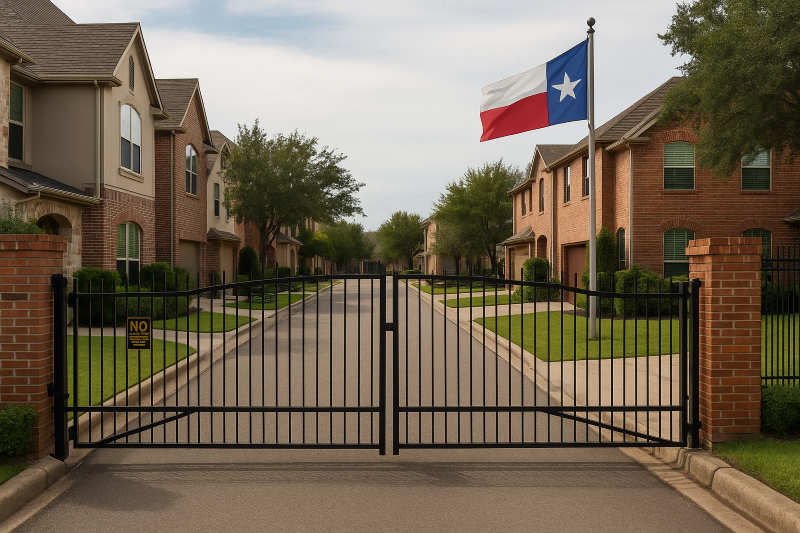
With rising concerns about crime and safety, many Texas homeowners wonder if they can install gates and restrict access to their neighborhoods. While it may seem like a simple solution, the legal and logistical hurdles involved especially when public streets are involved make it a far more complicated proposition. Here’s what you need to know before trying to turn your subdivision into a gated community.
Public Streets Mean Public Rules
Most neighborhoods in Texas were developed with public infrastructure in mind. Historically, a developer would plat the subdivision, marking out streets and then deeding them to the city. This wasn’t done out of generosity; it meant the city would be responsible for maintaining the roads.
If a neighborhood wants to reverse this and become gated, the city must agree to sell the streets back. That process is governed by Chapter 272 of the Texas Local Government Code, which outlines how municipalities can sell public land. This isn’t a quick or cheap fix most HOAs don’t have the financial resources to repurchase streets or fund ongoing maintenance.
Legal and Practical Complications
Let’s say your neighborhood can afford to buy back the roads. Even then, practical challenges remain. Many sections of the Texas Penal Code are designed with public access in mind. Turning a public street into a private one could raise issues like:
- How DUIs are prosecuted if the streets are no longer technically “public.”
- Emergency services access: While fire departments often have keys or codes to gated neighborhoods, it adds complexity and delay.
- Jurisdiction and enforcement: Local law enforcement may treat private neighborhoods differently, and that can impact how crimes are reported and prosecuted.
Is It Ever Done?
Yes, it is technically possible to gate off a Texas neighborhood, but it's rare. The process requires city approval, money to buy back the roads, and a well-organized HOA ready to manage everything from street maintenance to security protocols. Most neighborhoods find the cost, red tape, and legal gray areas aren’t worth the limited benefits.
Final Thoughts
While the idea of creating a gated enclave may be appealing, it's legally and financially challenging in Texas especially when dealing with public streets. Before pursuing this route, consult a real estate attorney and carefully consider both the upfront costs and long-term implications.
All information provided on Silblawfirm.com (hereinafter "website") is provided for informational purposes only, and is not intended to be used for legal advice. Users of this website should not take any actions or refrain from taking any actions based upon content or information on this website. Users of this site should contact a licensed Texas attorney for a full and complete review of their legal issues.
